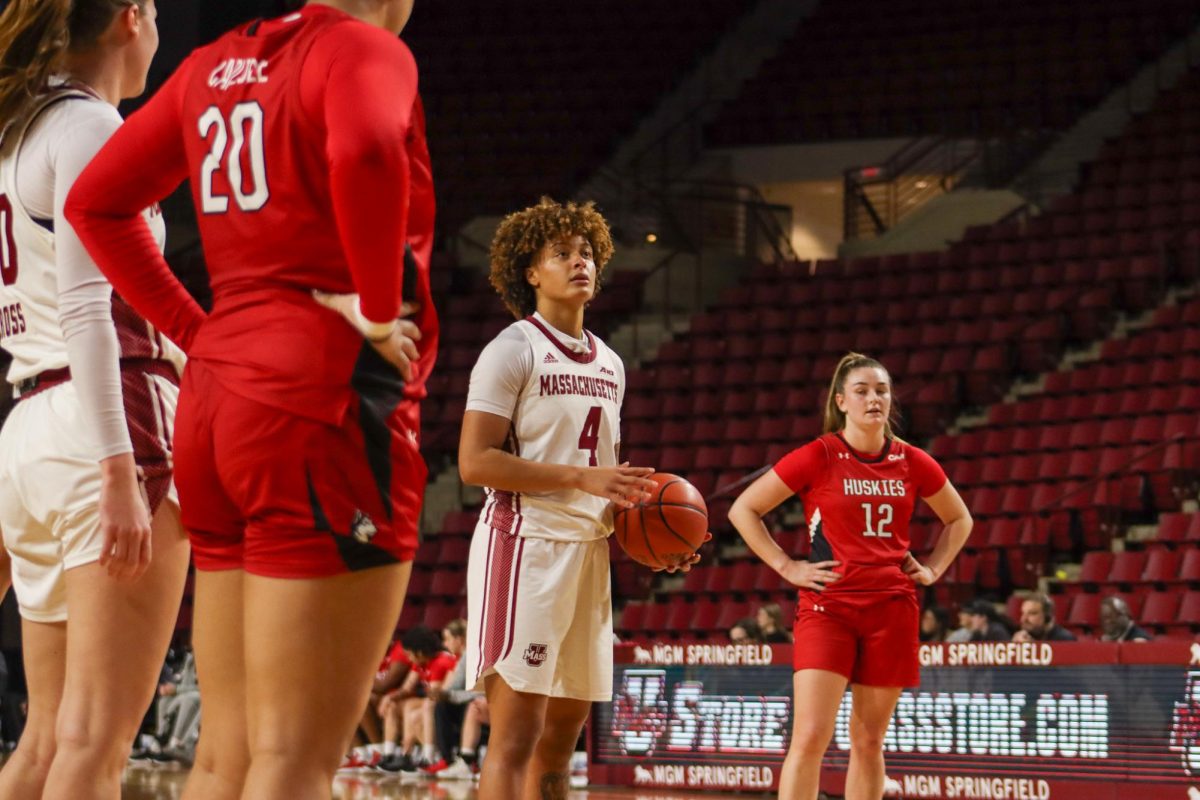Cahoon’s letter was obviously referring to the fact that the student section at hockey games has a tradition of chanting, in unison, that each player on the opposing squad performs actions similar to a vacuum cleaner and singing the family favorite ‘F&*# ’em up, F&*# ’em up, go UMass’ song after every home goal.
The coach’s sentiments were reflected in the
Their efforts however, were wasted.
The ‘F&*# ’em up, F&*# ’em up, go UMass’ song was sung, as expected, as students chose tradition over the ears of the young. And, using the school’s efforts against them, students used their ‘go UMass’ signs and showed only the last three letters to let each player on the opposing team know what part of the body they thought he reflected as he was introduced before the game.
The students love it. Student involvement plus chants times vulgarity equals fun.
Unfortunately, the students aren’t the only ones attending games. As Cahoon’s letter mentioned, the
The problem is, this is a college campus where swearing is part of everyday conversation and is even incorporated into lectures and readings by professors. It’s wonderful that there is outside interest in the athletic program, but when it clashes with the traditions set by the student body, the students have the edge.
I’m not here to endorse vulgarity. Wait, no. That’s a lie ‘- ‘ it’s exactly what I’m doing.
Swearing in front of little kids aside, there were over 7,000 people, about half of which were students, on the UMass campus that were not getting arrested, were not drinking and were showing support for the athletic program, which benefits the school.
If your kid has never heard an f-bomb, he or she should not be in a five mile radius of a college campus. It’s part of the culture of pretty much any campus. Plus, virtually every kid in this country has been exposed to some form of swearing before. If a kid has heard it through television, Internet and parents yelling at the guy who cut them off in traffic, and is still not using it themselves, a hockey game isn’t going to make them start.
Let’s face it: the cause of most student issues is boredom. If there were things to do on campus on a Friday night that were legal and a lot more fun than drinking, students would go and do it. So if swearing makes a hockey game attractive enough to take students away from the things that make UMass look bad ‘- drinking, smoking pot, rioting, getting into fights ‘- it’s worth it.
If vulgar student involvement makes sporting events attractive enough, it outweighs the negatives of the situation. And it’s not as if the entire atmosphere of UMass sporting events is based around swearing. The chanting only occurs a handful of times per game, depending on how many goals are scored.
There are a number other things to occupy a 10 year-old’s attention at these games other than what the kids in the student section are saying. Get the kid a foam finger, have him dance during those contests on the jumbo-tron, yell something else every time the students swear.
During the ‘F&*# ’em up, F&*# ’em up, go UMass’ song, parents should just be cheering along with the students and just say different words.
It’s really not that hard. Here: ‘Go, UMass. Go UMass. Go UMass. Here we go, here we go, go UMass.’ There, tell your kids to chant that.
Regardless of what the administration tries to do during a game, it’s not going to stop students from being belligerent and swearing their heads off. Students taking advantage of the ‘Go UMass’ signs is an example of this.
In fact, the best way to tone down the students would be to leave them alone. The student section will keep singing that song and demeaning players until it’s not fun anymore and won’t have anything else to use because no one gave them signs they could make swears with. But when that happens, they’re just going to stop going to games and drink in their dorms. So I ask you: which outcome is better?
Nick O’Malley is a Collegian columnist. He can be reached at [email protected].






